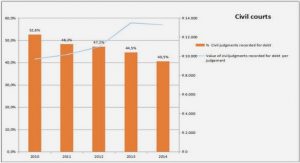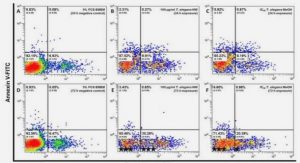Get Complete Project Material File(s) Now! »
Overview of the eThekwini Municipality within the national and provincial context
Within the context of growth, employment and addressing inequality, urban areas and cities in South Africa, which house 62% of the country‟s population, continue to show strong growth, therefore playing an important economic role in the country (UN-Habitat, 2014; CDE, 2016). Cities also play an important national role in redistribution, economic growth, sustainability and resilience and often have to balance agendas between access to basics needs and globalisation (Turok and Parnell, 2009; UN-Habitat, 2014; Parnell, 2016). The growth of cities is taking place in a context where South Africa and Africa as a continent fails to afford dedicated policy support to cities (Turok and Parnell, 2009; UN-Habitat, 2014; Parnell, 2016). However, local governments in South Africa have equal status with national and provincial government and important exclusive powers and functions in terms of the Constitution, such as municipal planning. Therefore it is important for local government to consider more radical and progressive changes to deal with urbanisation and planning. The eThekwini Municipality falls within the province of KwaZulu-Natal, one of nine provinces that is regarded as the most populated and with the highest level of poverty (eThekwini Municipality, 2015e). The municipal area also compares less favourably to the other metropolitan cities in terms of employment, average household income and levels of skills (eThekwini, 2015e). The high levels of poverty can also be linked to the large amount of rural traditional land (38%% of the province), and the historical legacy of poverty and the apartheid practice of race and ethnic separation (Mabin, 1992; eThekwini, 2013/2014a; eThekwini 2015e; CDE, 2016).
Emerging insights from the empirical data
The empirical data generated to answer sub-question one reinforced that planning knowledge, both strategic and regulatory planning knowledge, is all important to planning practice. Planning knowledge assumes multiple roles in directing, subjugating and giving power to planning practice. The chapter‟s findings are summarised as follows: Planning knowledge directs planning and it is legally binding, although often irrational, irrelevant and outdated. For these reasons it is imperative to construct planning knowledge from many settings and knowledge actors and users. Planning knowledge needs to be flexible and simple and should be used and applied in varying contexts, with exceptions as required. Planning knowledge should avoid „locking in‟ practice through, for example, using words in text such as „shall‟ and „must‟ or overly comprehensive lists of what is permissible and what is prohibited. Context, dialogue, discussion, collaborative rationality, practicality and opportunity should be encouraged by planning knowledge. Decentralisation and varied decision-making is part of a healthy planning system: Consistent processes in arriving at planning decisions are possible but consistencies in decisions are not possible simply because context varies. The pre-occupation with streamlining planning knowledge outside context of place and history is a loss to diversity in planning knowledge. Furthermore, a good planning system is one that is built on transparency, application of thought, decentralisation of decision-making and being able to engage with varying situations.
CHAPTER ONE: INTRODUCTION
1.1 Rationale
1.2 Context
1.3 Clarification of research concepts
1.4 Research problem and conceptualisation
1.5 Research gaps
1.6 Research objectives
1.8 Summary of research methodology
1.9 Study contributions
1.10 Structure of thesis
1.11 Conclusions
CHAPTER TWO: THEORETICAL FRAMEWORK
2.1 Introduction
2.2 And the practitioner muddles through in establishing a theoretical framework for the study
2.3 Communicative and deliberative planning theory
2.4 Institutionalism and planning
2.5 Planning culture and institutions
2.6 Rationality and power, rationality and politics, politics and professionals
2.7 Back to phronesis as important knowledge for policymaking
2.8 Conclusions
CHAPTER THREE: LITERATURE REVIEW
3.1 Introduction
3.2 Rethinking planning theory and practice in the context of African urbanism
3.3 What guides and directs planning practice
3.4 Land use planning knowledge as an opportunity for transforming planning practice and planning outcomes
3.5 At the knowledge boundary! Epistemic cultures as a future
3.6 Thinking differently about who are knowledge and epistemological agents for land use planning knowledge
3.7 Seeing clearly again – Taking back the power of agency in transforming planning practice for everyday lives
3.8 Summary of the literature reviewed
3.9 Conclusions
CHAPTER FOUR: RESEARCH DESIGN, METHODOLOGY AND „RESEARCH SITE‟
4.1 Introduction
4.2 Research design and identity
4.3 Synopsis of research strategy and research methods
4.4 Research methods, preparation and access to participants
4.5 About the researcher
4.6 Ethical clearance
4.7 Approval process to locate the research within the eThekwini Municipality
4.8 An overview of the eThekwini Municipality – the institution
4.9 Preparing data, analysis, interpretation and theorising of data
4.10 Data analysis strategy
4.11 Summary and Conclusions
CHAPTER FIVE: INSIGHTS INTO PLANNING – „FROM THE CITY OF DURBAN TO THE METROPOLITAN MUNICIPALITY OF ETHEKWINI‟
5.1 Introduction
5.2 Planning in Durban – „a shared relationship with international planning‟
5.3 Apartheid planning for the City of Durban
5.4 Planning particularities within the City of Durban and the Province of Natal
5.5 A Time to Enter the Municipality
5.6 From the City of Durban to the eThekwini Municipality: an important time for constructing land use planning knowledge
5.7 Planning as a municipal function and institutional arrangements over time
5.8 Overview of the eThekwini Municipality within the national and provincial context
5.9 Conclusions
CHAPTER SIX: HOW IS LAND USE PLANNING KNOWLEDGE USED IN PLANNING PRACTICE WITHIN ETHEKWINI MUNICIPALITY?
6.1 Introduction
6.2 Land use planning knowledge directs action because it‟s legal
6.3 The power of planning knowledge – it compels appeal authorities to ensure compliance first before considering reason
6.4 The knowledge in use and re(use) comes from the past – with its hidden ideology of domination and segregation
6.5 The roles of land use planning in practice – excludes stakeholders
6.6 When the basics of planning knowledge are not so basic
6.7 The role and (in)credibility of planning consultants within planning practice
6.8 Only the consultant could convince the planners that the UDL is incorrect!
6.9 A hierarchical approach to sector knowledge: some sectors and some personalities are more important than others
6.10 When political knowledge matters more than any other knowledge
6.11 Emerging insights from the empirical data
6.12 Conclusions
CHAPTER SEVEN: HOW IS LAND USE PLANNING KNOWLEDGE FOR ACTION BEING DEVELOPED/ REDEVELOPED INSTITUTIONALLY WITHIN THE ETHEKWINI MUNICIPALITY?
7.1 Introduction
7.2 Social relations and unintended consequences in the (re)development of planning knowledge for action
7.3 Uncovering the power–knowledge–decision nexus
7.4 The generation of planning knowledge for action within the eThekwini Municipality – views from the inside
7.5 “The TPS is the ultimate guide for everyone” – flexibility and discretion versus control
7.6 Democracy in practice – participation at its minimum, symptoms of a weak and fragmented institution
7.7 The absence of research, reflection and learning in the (re)development of planning knowledge
7.8 The role/s of research, teaching and planning organisations
7.9 We are so tired but we continue to do our best
7.10 Emerging insights from the empirical data
7.11 Conclusions
CHAPTER EIGHT: WHAT ARE STAKEHOLDERS‟ EXPERIENCES AND PERSPECTIVES ON LAND USE PLANNING KNOWLEDGE, FOR INFORMING PLANNING PRACTICE WITHIN THE ETHEKWINI MUNICIPALITY?
8.1 Introduction
8.2 Stories of community activists – supporting, expanding and confronting planning knowledge and practice
8.3 Resident/community interviews – experiences and expectations for planning knowledge – those we plan for, but never ask
8.4 Aspects of planning knowledge
8.5 An alignment between community activist stories and community interviews
8.6 Response from practitioners to the community/resident interview findings and development activists stories
8.7 Emerging insights from the empirical data
8.8 Conclusions
CHAPTER NINE: HOW IS LAND USE PLANNING LEGISLATION BEING DEVELOPED/REDEVELOPED WITHIN AND FOR THE ETHEKWINI MUNICIPALITY?
9.1 Introduction
9.2 The making of legislation and it is not so upright
9.3 The beginnings of a planning by-law for the eThekwini Municipality – an opportunity or missed opportunity to transform planning knowledge for action
9.4 So what happened when SPLUMA was finally implemented?
9.5 What‟s wrong in learning from each other and others?
9.6 Emerging insights from the empirical data
9.7 Conclusions
CHAPTER TEN: INTEGRATION OF EMPIRICAL FINDINGS WITH THEORETICAL FRAMEWORK AND LITERATURE
10.1 Introduction
10.2 Discussion of empirical findings and the literature reviewed
10.3 Discussion of empirical findings and the conceptual framework – nuancing, expanding and deepening existing
theory
10.4 Policy considerations for the (re)development of land use planning knowledge for practice
10.5 Re-joiner – what is land use planning knowledge for practice?
10.6 Summary and Conclusions
CHAPTER ELEVEN: CONCLUSIONS
11.1 Introduction
11.2 Reflections on the Research
11.3 Implementing the research findings – possibilities and limitations
11.4 Limitations of the study
11.5 Future research agendas
11.6 Planning as a discipline – stuck at the crossroads
11.7 Self-reflections and future contributions to planning practice
11.8 Conclusion






